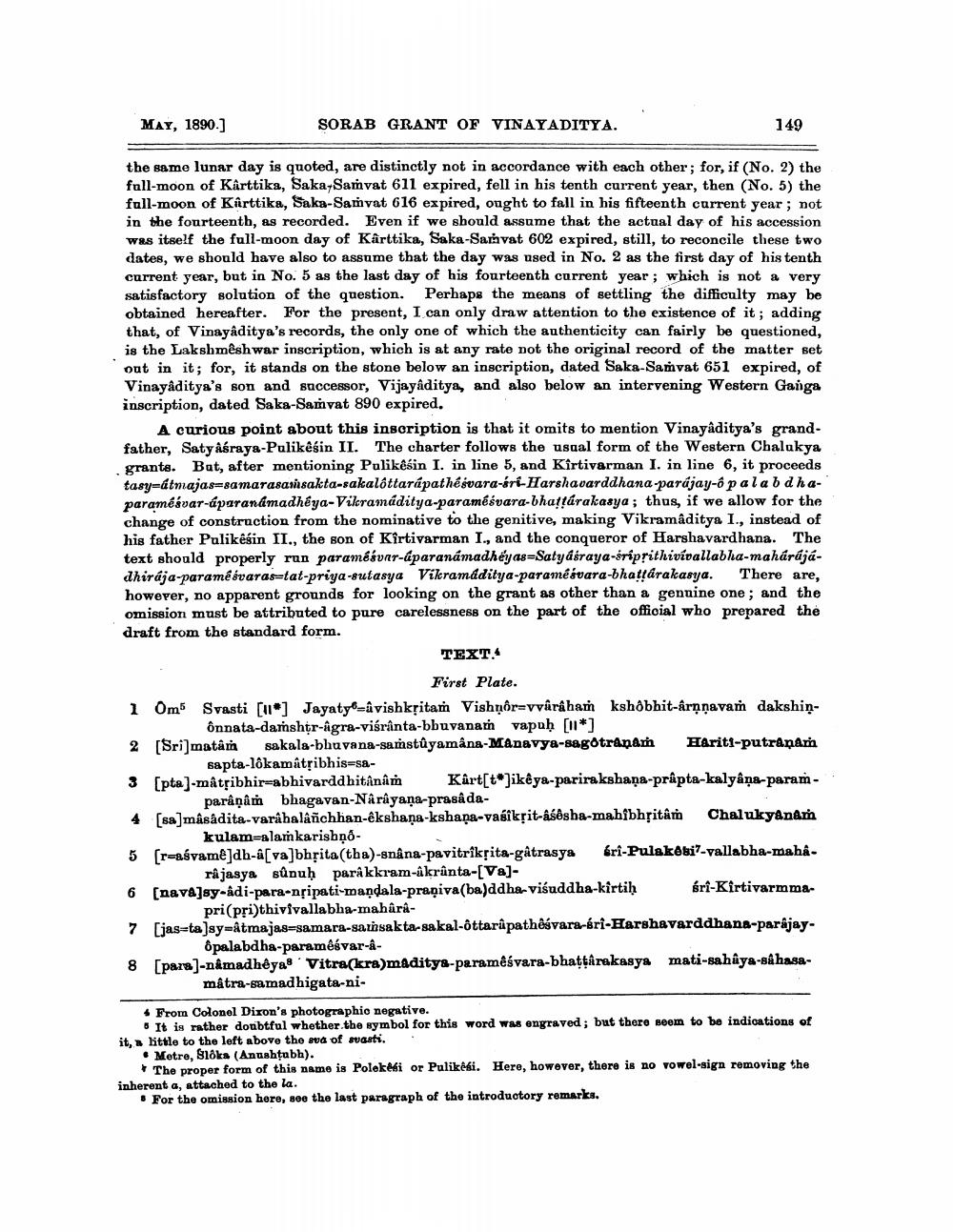________________
MAY, 1890.)
SORAB GRANT OF VINAYADITYA.
149
the same lunar day is quoted, are distinctly not in accordance with each other; for, if (No. 2) the full-moon of Karttika, Saka Samvat 611 expired, fell in his tenth current year, then (No. 5) the full-moon of Kirttika, Saka-Samvat 616 expired, onght to fall in his fifteenth current year; not in the fourteenth, as recorded. Even if we should assume that the actual day of his accession was itself the full-moon day of Kârttika, Saka-Sanvat 602 expired, still, to reconcile these two dates, we should have also to assume that the day was used in No. 2 as the first day of his tenth current year, but in No. 5 as the last day of his fourteenth current year; which is not a very satisfactory solution of the question. Perhaps the means of settling the difficulty may be obtained hereafter. For the present, I can only draw attention to the existence of it; adding that, of Vinayaditya's records, the only one of which the authenticity can fairly be questioned, is the Lakshmeshwar inscription, which is at any rate not the original record of the matter set out in it; for, it stands on the stone below an inscription, dated Saka-Samvat 651 expired, of Vinayaditya's son and successor, Vijayaditya, and also below an intervening Western Ganga inscription, dated Saka-Samvat 890 expired.
A curious point about this inscription is that it omits to mention Vinayaditya's grandfather, Saty Aśraya-Pulikesin II. The charter follows the usual form of the Western Chalukya grants. Bat, after mentioning Pulikeáin I. in line 5, and Kîrtivarman I. in line 6, it proceeds tasy-átmajas=samarasassakta-sakalóttarápathésvara-ári-Harshavarddhana-parájay-ô palabdhaparaméávar-úparanámadhéya-Vikramaditya-paraméśvara-bhattárakasya; thus, if we allow for the change of construction from the nominative to the genitive, making Vikramaditya I., instead of his father Palikesin II., the son of Kirtivarman I., and the conqueror of Harshavardhana. The text should properly run paramésvnr-uparanámadhéyas-Satyásraya-sriprithivídallabha-mahárájádhirája-paramé óvarastat-priya-sutasya Vikramdditya-paraméávara-bhattárakasya. There are, however, no apparent grounds for looking on the grant as other than a genuine one; and the omission must be attributed to pure carelessness on the part of the official who prepared the draft from the standard form.
TEXT.
First Plate. 1 Om Svasti [11] Jayaty-avishkļitam Vishņôr=vvåraham kshobhit-arnnavam dakshin
Ônnata-damshtr-îgra-visränta-bbuvanan vapuh (.1*] 2 [Sri]matam sakala-bhuvana-samstùyamâna-Manavya-sagötranam Hariti-putranam
sapta-lokamâtribhis-sa3 [pta)-matsibhir-abhivarddhitanam Kart[t*]ikêya-parira kshana-prapta-kalyana-param
parâņam bhagavan-Narayana-prasada4 [sa]mâsâdita-varâhalañchhan-êkshana kshana-vasikțit-aśôsha-mahibhritâm Chalukyanan
kulam-alamkarishạő5 (r=aśvame]dh-[va]bhřita(tha)-snâna-pavitrikrita-gâtrasyaéri-Pulakebi7-vallabha-maha
rajasya sûnuḥ para kkram-akrûnta-[Vs]6 [nava]sy-adi-para-npipati-mandala-praộiva(ba)ddha-visuddha-kirtih śr-Kirtivarmma
pri(pri)thivivallabha-mahara7 [jasæta]sy=&tmajas samara-satnsakta-sakal-ôttarûpathêsvara-bri-Harshavarddhana-parajay
Opalabdha-paramèsvara8 [para)-námadhêya ' Vitra(kra)maditya-paramêśvara-bhattarakasya mati-sahîya-s&hasa
matra-samadhigata-ni
4 From Colonel Dixon's photographio negative.
It is rather doubtful whether the symbol for this word was engraved; but there seem to be indications of it, little to the left above the eva of svasti.
• Metre, Slöks (Anushtabh).
The proper form of this name is Polekébi or Pulikesi. Here, however, there is no vowel-sign removing the inherent a, attached to the la.
. For the omission here, see the last paragraph of the introductory remarks.




